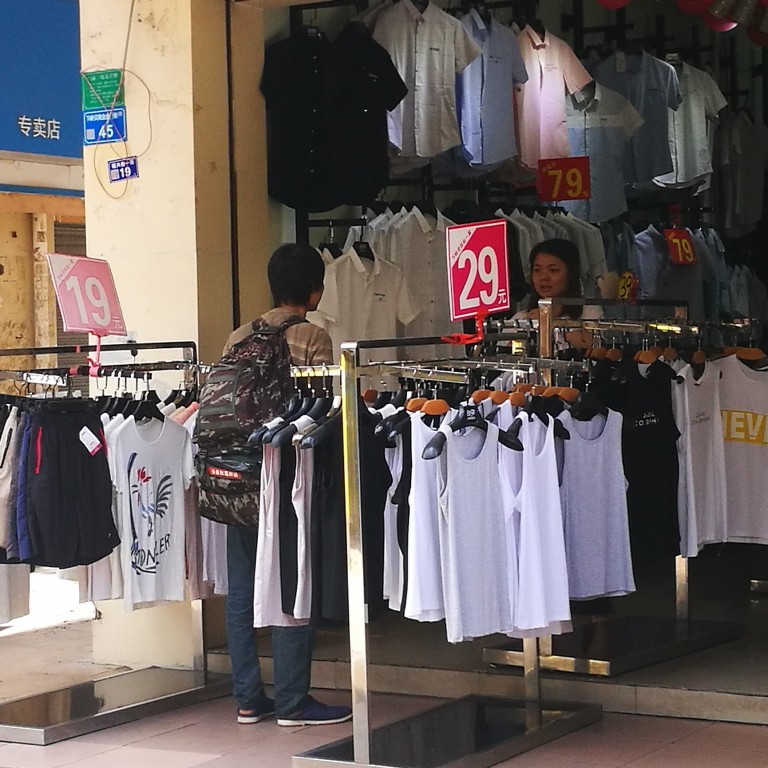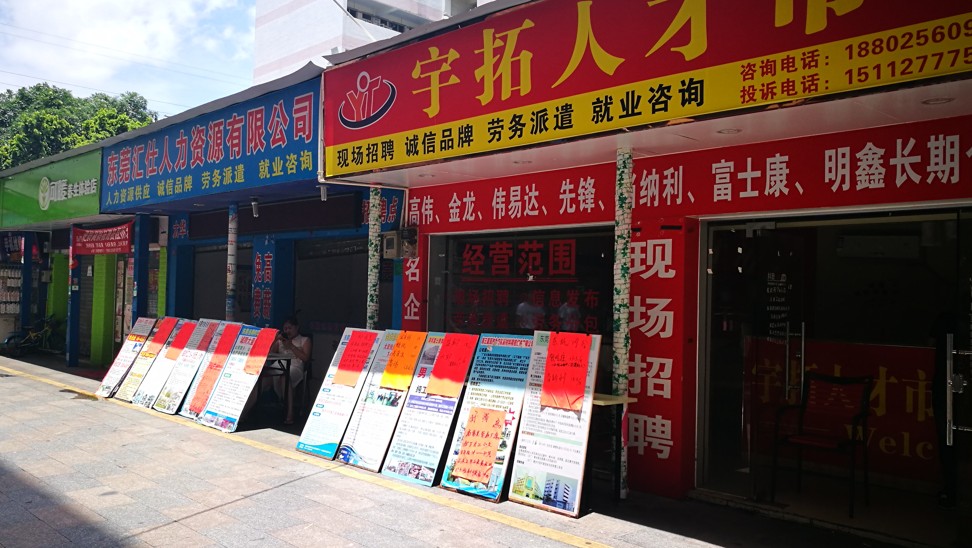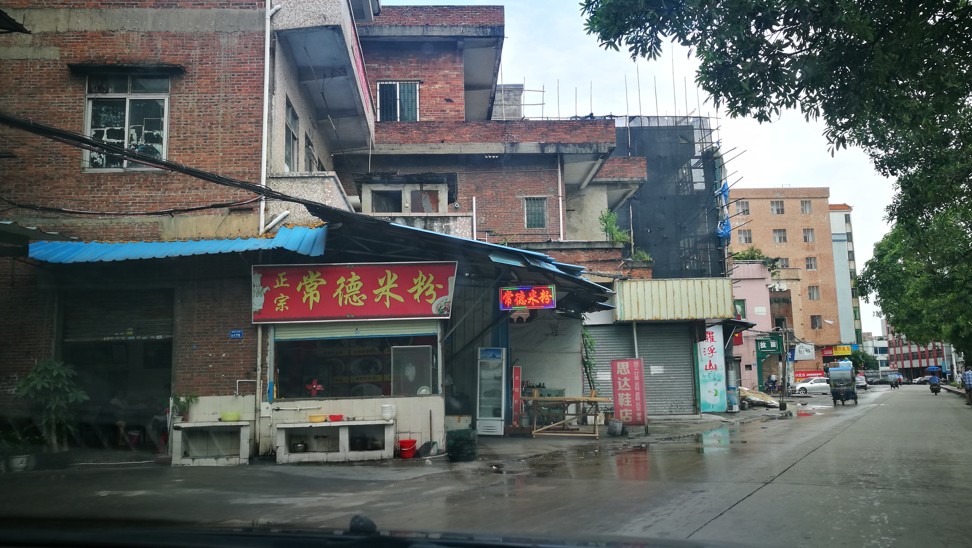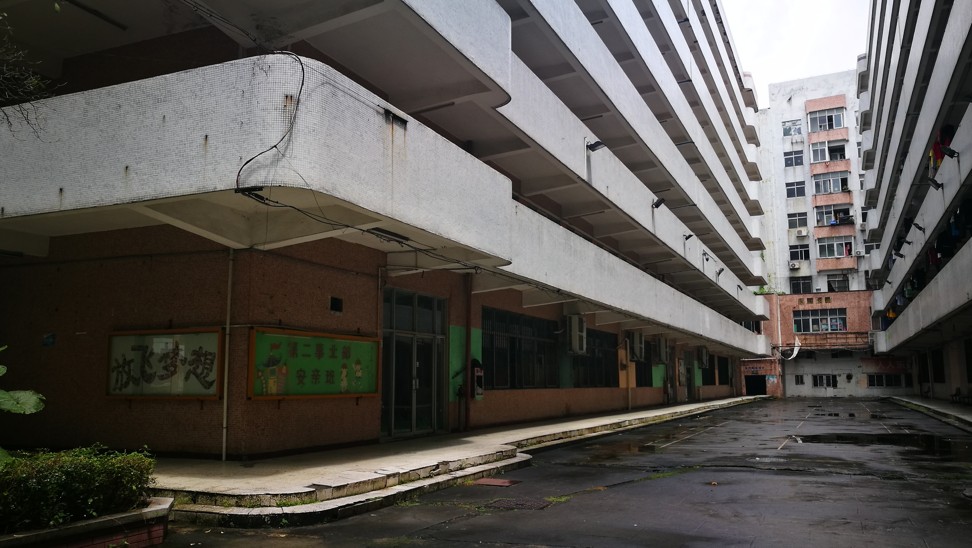
China’s migrant workers worried by dwindling jobs, low pay, as US trade war impact runs deep
- China has some 280 million migrant workers, but factories are downsizing, cutting overtime and even relocating overseas
- Mood of factory workers underlines outlook from purchasing managers' index and export order as Trump administration tariffs hit orders
On a normal Wednesday afternoon, a migrant worker in his mid-20s from Hubei province is deciding which shirt to buy from a budget shop next to a large electronics factories in Dongguan, one of China’s most prosperous manufacturing cities located in the southern province of Guangdong.
Li Zhong opts for a white shirt costing 79 yuan (US$11.5), changing out of the brown T-shirt he arrived in at the shop, with the hope that his new purchase will make him stand out from the crowd during his interview for the production line job on offer at the Hong Kong-invested factory.
“I think I look smarter and will make a good impression on the interviewer. This is a large foreign-funded factory with good room and board benefits as well as proper social insurance and housing payments. I heard that the monthly salary could be 4,500 yuan (US$655) [per month] or more, and the overtime hours are a stable two to three hours a day. Now, it is not easy to find a factory job with such conditions.” Li said.
Li’s situation is echoed by other migrant workers in Dongguan, with working conditions in China’s export industries deteriorating due to the trade war with the United States.

The well-being of workers like Li is a cause for concern for China’s decision makers and the risks of mass unemployment are at the top of the agenda for Beijing as there are growing signs of job market stress in places and sectors affected by the trade war with the United States. China’s official jobless data paints a stable employment picture, although it generally does not include migrant workers.
Fewer jobs and lower pay within the manufacturing sector could hurt China’s long-term plan of relying on domestic consumption to boost the economy, as stagnated income levels for the country’s 280 million migrant workers could limit their spending power.
Feelings on the ground indicate there are fewer jobs of any kind in export industries, a worrying trend for the central government, which fears social instability if unemployment rises. In response, Beijing has implemented special programmes to keep unemployed migrant workers in the coastal provinces where they were previously employed and not return to interior provinces where there are even fewer jobs.
And given the worsening outlook for factory jobs, workers are increasingly seeking employment with large employers with some promise of job stability, in stark contrast to the export boom years when workers preferred flexible, short-term jobs that allowed them chase the best salaries and working conditions.
By 3pm, Li has joined dozens of other young migrant workers lining up for interviews. The trade war has led their salaries to stagnate or even decline as factories have cut back on overtime or even suspended production on certain days due to a drop in orders.
“The Americans are very evil and want to kill our exports and economy! Our factories’ orders are declining, and so is our overtime pay,” said one worker, who did not want to be identified but who has worked in Dongguan factories for 10 years.
“For example, a shoe factory worker in his 30s or 40s could earn about 3,600 yuan (US$524) [per month] last year, but now only about 3,300 yuan (US$480). An electronics factory worker in his 20s could earn up to 6,000 or 7,000 yuan, but now only about 4,000 yuan because of big overtime pay cuts.”
The Americans are very evil and want to kill our exports and economy! Our factories’ orders are declining, and so is our overtime pay
He has joined Li in the hunt for a new job having left his position as a polisher at Lens Tech, a manufacturer of glass used for smartphone covers for companies including Huawei. In the middle of last year, he earned up to 7,000 yuan per month, including 2,130 yuan of basic salary, as well as up to 3,800 yuan overtime pay for working 159 hours a month.
“But soon after, the factory no longer let workers work much overtime and I didn’t have much money. So I quit the job,” he said. “I thought I could quickly find another job with the same pay, but a few months passed and things have changed.”
Many workers only want to work for foreign companies, as it usually means a stable monthly salary of between 4,000 yuan (US$582) and 5,000 yuan and good working conditions, according to one female worker in her early 20s, whom other jobseekers called Ah Juan.
“Last year, we said a good job was at least 5,000 or even 6,000 yuan per month, though it required heavy overtime work. But now, few production line workers can get a job for 5,000 yuan, let alone 5,500 yuan or above” she said.
“Working for a large foreign factory means that if one day you are laid off, you will get good compensation.”
Factories are increasingly relying on temporary workers or dispatched labour, who come from labour agencies and do not have a contract with the factory itself, according to another worker.

This allows greater flexibility for factories, with overseas buyers increasingly placing only short-term orders because of concerns about soaring labour and raw material costs, according Peng Peng, vice-president of Guangdong’s South non-governmental think tank.
“The US-China trade war has spurred the trend of declining export orders [for production in China] and companies are searching for lower-cost replacement production outside of China.” Peng said.
“But according to the official data, the local economy performed well early this year … we need to wait and see further data for the middle of this year.” Peng added.

Official data shows the economy in Guangdong province grew 6.6 per cent in the first quarter of 2019, while growth in Dongguan rose 7 per cent. The valued added output by Hong Kong, Macau and Taiwan-invested companies in Dongguan stood at 25.7 billion yuan (US$3.7 billion) in the first quarter, up 0.3 per cent, while the value added output of other foreign enterprises in Dongguan was 13.6 billion yuan (US$2 billion), down 4.1 per cent.
In Gaobu township, Yue Yuan – the world’s largest footwear manufacturer supplying the likes of Nike, Adidas, Reebok, Asics, New Balance and Puma – once employed over 100,000 workers.
But their 1.4 square metre (15 million sq ft) complex in Dongguan that used to be bustling with young migrant workers is now largely deserted, as well as a large number of shops nearby, after Yue Yuan cut its workforce to just 10,000 having decided to relocate some production to southeast Asia from 2016.

